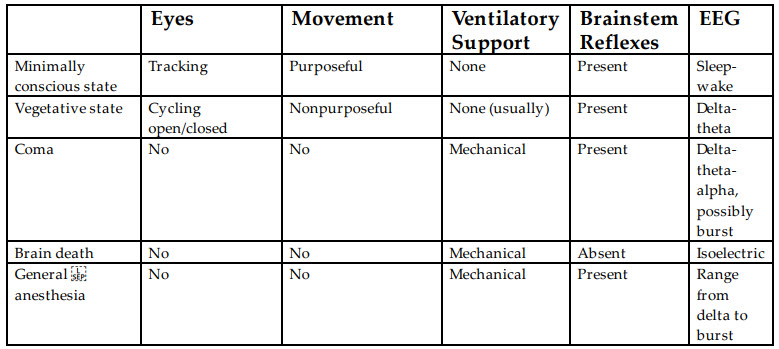Question 4#
A 50-year-old man was involved in a motorcycle accident over July 4th weekend. He received cardiopulmonary resuscitation (CPR) on the scene until arrival of emergency medical services, with return of spontaneous circulation in transit to the hospital. He underwent decompressive craniectomy and subdural hematoma evacuation for which he has been recovering in the intensive care unit for 2 weeks. He remains intubated and under continuous electroencephalography (EEG) monitoring. Despite being off sedative medications, he has yet to regain consciousness. The neurologist consulted is leaving for vacation and asks you to perform an examination and document an assessment for coma today. The patient intermittently opens his eyes, moves bilateral upper extremities without purpose, and has a strong cough and gag reflex. EEG demonstrates delta waves with no evidence of sleep patterns.
Which of the following is the most likely diagnosis?
A. General anesthesiaB. Coma
C. Brain death
D. Vegetative state
E. Minimally conscious state
Correct Answer is D
Comment:
Correct Answer: D
The table below outlines key features and differences in the stages of recovery from coma and general anesthesia:

This patient demonstrates brainstem reflexes and EEG activity inconsistent with brain death (C). The presence of eye movements eliminates general anesthesia and coma (A, B). Although he is intubated, we cannot infer about ventilator dependence based on the information provided. The presence of nonpurposeful movements, coupled with the absence of sleep-wake activity on EEG, eliminates minimally conscious state as a diagnosis (E). This clinical picture is most consistent with vegetative state.
References:
- Brown EN, Lydic R, Schiff ND. General anesthesia, sleep, and coma. N Engl J Med. 2010;363:2638-2650.
- Edlow BL. Giacino JT, Wu O. Functional MRI and outcome in traumatic coma. Curr Neurol Neurosci Rep. 2013;13(9):375.
- Laureys S, Owen AM, Schiff ND. Brain function in coma, vegetative state, and related disorders. Lancet Neurol. 2004;3:537.